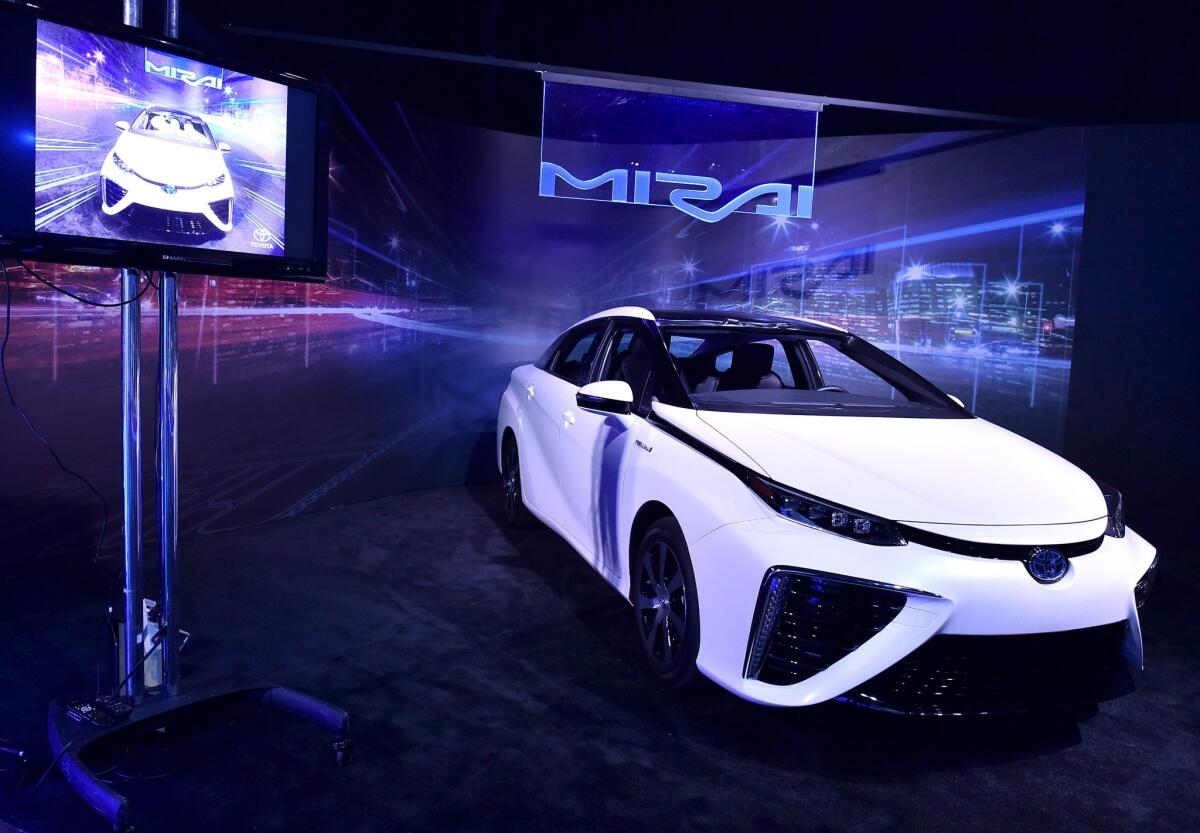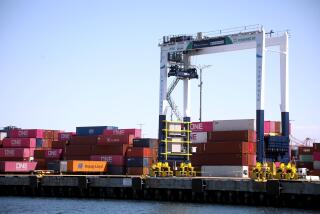Toyota Mirai hydrogen car makes Hollywood debut

Toyota took the wraps off its new 2016 hydrogen fuel cell vehicle -- the Mirai, which means “future” in Japanese. The zero-emissions vehicle will cost about $58,000 before rebates and incentives.
- Share via
Toyota’s new hydrogen fuel cell vehicle got a gala Tinseltown opening Tuesday night as the automaker used a historic Hollywood movie studio to unveil its Mirai sedan.
On a movie lot where early “Tarzan” movies were shot, Toyota executives -- assisted by video projections featuring actors Michael J. Fox and Christopher Lloyd -- used a “Back to the Future” theme to promote the arrival of the zero-pollution hydrogen-powered vehicle.
“It’s a special day for all of us,” Fox said in a video presentation. “It’s the day the future becomes reality.”
On hand were some of the 300 owners of the Mirais already sold -- a portion of the 2,000 prospective owners who have ordered the four-door hydrogen-burning cars -- and representatives from the dealerships handling delivery of the cars.
About 40 owners received keys to the new vehicles, which they should be able to actually drive within a week or so, Toyota said, adding that at least 100 Mirai drivers will be on the road by the end of the year. The company has said it hopes to sell 1,000 Mirais by the end of 2016, and perhaps 3,000 by the end of 2017.
One of the early adopters was Tyrone Tripp, who drove in from Santa Ana to get a virtual key and see in person the car he ordered and hopes to receive next May.
He said he decided to check out the Mirai because the hydrogen fuel cell power train meant “no more gasoline -- because I hate the stuff.” Under pulsing DJ music at the historic Quixote Studios, disco lights and a fog machine enshrouding him and four Mirai prototypes, he said he decided to buy one after being impressed by the acceleration.
Toyota has said the Camry-size Mirai will have a range of 300 miles and be capable of a five-minute refueling. Like all hydrogen fuel cell cars, it will be outfitted with an electric motor, driven by a hydrogen fuel stack, with only water vapor as its tailpipe emission.
Available in only four colors, with a minimalist interior, the Mirai is propelled by a hydrogen-powered electric motor said to be capable of producing 151 horsepower and 247 pound-feet of torque. Toyota has said the 4,080-pound Mirai can accelerate from zero to 60 mph in 9 seconds.
The technology isn’t cheap. The futuristic Mirais, already on sale in Japan, will cost $58,325 in the U.S. Federal and state incentives could knock as much as $13,000 off that price tag, but the cost of owning a base model Miral will still be above $45,000.
Toyota said the bulk of Mirai drivers will lease the cars. Leases will start at $499 a month after a roughly $4,000 down payment.
In person, the Mirai isn’t quite as ugly as some critics have said. Though some have complained about the large triangular air scoops that mar the face of the Mirai -- the scoops are needed to blow cool air onto the hydrogen fuel cell stacks -- the vehicle looks from most angles like a fairly generic Japanese sedan.
The interior design is clean and spare, free of many of the traditional automotive gauges and dials. A large screen transmits information about the car, but an old-fashioned gasoline pump icon warns of low fuel levels.
Seats more reminiscent of an upmarket Lexus than a utilitarian Prius are comfortable. The rear cabin offers substantial leg room and head room.
It won’t be alone on the road, but the hydrogen fuel cell field is anything but crowded.
Hyundai Motor Co. started leasing a hydrogen fuel cell version of its Tucson sport utility vehicle this year. Honda Motor Co., which has spent years testing and leasing its FCX Clarity fuel cell vehicle, is preparing to launch a new fuel cell car next year in Japan, with a U.S. version soon to follow.
Ford Motor Co., which has put 1.3 million test miles on a fleet of 300 fuel cell vehicles over the last several years, recently cut a deal with Daimler, Renault and Nissan to develop a joint fuel cell technology that all four companies would share.
General Motors Co., which holds more patents for hydrogen fuel cell technology than any other carmaker, has similarly tested its HydroGen4 car. GM has partnered with Honda, its rival for the number of new fuel cell patents each year, to co-develop new automotive fuel cell applications.
Southern California is already home to the nation’s most extensive network of fueling stations, but to date there are very few stations in operation, and fewer still that can service retail customers.
Toyota representatives said California has only two retail sites currently open, where fuel cell vehicle owners can purchase hydrogen with a credit card. Four more will be open in the next two weeks, and an additional eight will be on line by the end of the year, Toyota said.
Previously, most hydrogen fuel cell customers held leases on the vehicles, and those leases typically came with a fuel card and PIN, which customers could use at fueling stations not otherwise open to the public.
Toyota previously announced it had partnered with the hydrogen infrastructure company Air Liquide to begin developing a network of 12 stations on the East Coast. Designed to fill the corridor between Boston and New York, the 12 stations will be built in New York, New Jersey, Massachusetts, Connecticut and Rhode Island. The cars will be introduced into that region in 2016, the company said.
Twitter@misterfleming
Hoy: Léa esta historia en español
ALSO:
2016 Toyota Tacoma stays quiet and comfy on and off pavement
Tesla quality problems could signal challenges with Model X and Model 3
Review: 2016 Bentley Continental GT Speed gets you there quickly, quietly in style







